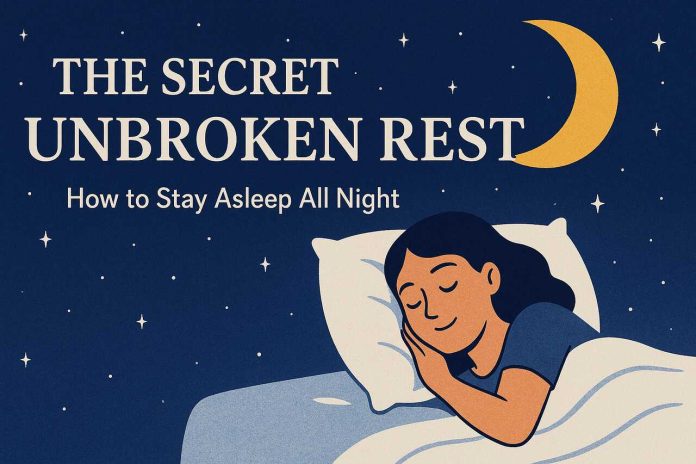Are you one of the many individuals who wake up in the middle of the night? And after you wake up, sometimes it takes time for you to fall back to sleep. Your sleep quality is poor, and you don’t feel refreshed and restored when you wake up.
Waking up in the middle of the night is normal. You may experience mini-awakenings without even noticing them. If you want to know how to stay asleep all night, this article is for you.
Note: If you don’t want any trouble staying asleep at night, use a rain sound machine for uninterrupted sleep and wake up feeling refreshed.
Understanding Why You’re Waking Up
The first step on how to stay asleep all night is understanding why you’re waking up. Here are a few reasons why you’re waking up in the middle of the night.
- Stress
Stress can impact your sleep quality. Overthinking about all of your problems before you go to bed can keep your nervous system in ‘panic mode’ and make deep sleep challenging. It is important to address your stress levels. Turn off your phone and TV at least an hour before bed. Do low-key relaxing activities to acclimate your body to sleep
2. Sleep apnea
Ruling out sleep apnea is essential. Ask your roommate if you snore; if you do, there’s a high chance you have sleep apnea. How loud you snore is often seen as only a nuisance, but it could potentially be a sign of a serious problem. Sleep apnea increases your chance of dying from heart disease and developing type 2 diabetes.
3. Hypoglycemia
In nocturnal hypoglycemia, your blood sugar decreases so suddenly and significantly that your body wakes you up to raise your blood sugar. Nocturnal hypoglycemia can be caused by a poor diet filled with processed foods with very low carbohydrates, which causes your body and brain to starve for adequate blood sugar.
4. Fatty liver disease
For most adults, the most common cause of waking up between 1:00 am and 4:00 am is a liver problem. Your circadian rhythm is your body’s internal clock and ensures that all your organs and internal biological systems work well together. It is during this period that your liver works its hardest to detoxify and cleanse your body while you sleep.
Your Bedroom Environment and How It Affects Your Sleep
Your bedroom setup significantly affects the way you sleep. In fact, when your bedroom is uncomfortable, there are higher chances that you’ll wake up more often during your sleep. Here’s how you can ensure that you stay asleep throughout the night.
- Bright lights can keep your brain awake, and it may be difficult for you to stay asleep. Use room-darkening blinds or window coverings to block external light. Light slows down the production of melatonin in your body, the sleep hormone that promotes sleep
2. A noisy neighborhood or a dog barking in the night is enough to wake you up from sleep. Fortunately, you can block out these noises by using a rain sound machine. This machine gives off calming and relaxing sounds as they drown out the other distracting sounds.
3. Bedroom temperature also impacts your sleep. As you sleep, your body temperature goes down. Having a cooler room will cool your body faster and will help you reach a more restorative and deeper sleep
4. You’ll feel more relaxed lying on a comfortable bed. If your mattress and pillows are not comfortable enough, replace them. This is a good investment that will help you get more quality REM sleep.
The Role of Your Diet and Evening Routine
If you keep waking up during your sleep, your diet and evening routine might be the reasons. Although there’s little evidence that you can eat yourself to sleep, diet can certainly impact it negatively. Including the following foods in your diet can induce sleep more than others.
- Calcium: A lack of calcium can make it harder for you to fall asleep and may cause you to wake soon after falling asleep. Studies have shown that low calcium levels are linked to poor REM sleep.
- Magnesium: Magnesium is a mineral that can improve your sleep quality, especially for individuals experiencing insomnia. This mineral reduces the inflammation and your stress hormone cortisol
- Tryptophan: The amino acid, Tryptophan, increases your melatonin, a sleep-inducing hormone
In addition, establishing a consistent evening routine will help you wind down and prepare for bed, resulting in uninterrupted sleep. Evening routines can also:
- Lowers your stress levels
- You feel more energized and feel less fatigued
- You have better communication with others
- You have a lower risk of disease and have a stronger immune system
- You tend to be more productiv
The Surprising Link Between Exercise and Sleep Quality
Exercises can also help you have uninterrupted sleep. When you’ve done nothing much during the day, it is difficult for you to fall asleep, but after being productive throughout the day, you are more likely ready for sleep as soon as you’re in your bed. Exercise in your everyday routine impacts your health and sleep. Here are some of the exercises you can do:
- Yoga
- Stretching
- Walking or running
- Swimming laps
- Light to heavy weightlifting
- Biking
Simple Relaxation Techniques to Try Before Bed
Simple relaxation techniques can help you set the right mood before you doze off and make it easier for you to stay asleep through the night.
The 4-7-8 Breathing Method
The 4-7-8 breathing method is a breathing pattern developed by Dr. Andrew Weil. This method came from the ancient yogic technique known as pranayama, which helps practitioners gain control over their breathing. Here’s how to do this method:
- Place the tip of your tongue behind your upper front teeth
- Exhale completely through the mouth and make a whoosh sound
- Close your mouth and inhale through your nose while counting to four seconds in your mind
- Hold your breath and mentally count to seven seconds
- Exhale completely through your open mouth, making a whoosh sound and mentally counting to eight seconds
- Repeat at least three more times
The Military Method
This method came from a 1981 book entitled “Relax and Win: Championship Performance”, and writer Sharon Ackman reported on it. She wrote that the US Navy Pre-Flight School formulated a method to fall asleep in any conditions, within two minutes. Here’s how to do this technique:
- Relax your entire face
Close your eyes and breathe slowly and deeply. Then slowly relax all of your entire face muscles. Start with your forehead muscles and work your way down. Relax your jaw, mouth, cheeks, tongue, and your eyes.
2. Drop your hands and shoulders
Release any tension. Relax your neck and your traps; feel yourself sinking into your bed. Then start at the top of your right arm, and slowly relax your biceps, hands, and forearms. Repeat this on the other side. Keep your breathing slow and deep.
3. Exhale and relax your chest
Exhale with your shoulders and arms relaxed.
4. Relax your legs
Rest your legs and start with your right thigh; let it sink into your bed. Then repeat it on your calf, foot, and ankle. Repeat the process with your left leg.
5. Clear your mind
For ten seconds, imagine you’re lying in a pitch-black room or on a comfortable bed. If you are having difficulty clearing your mind, repeat the words, “don’t think”, over and over.
If this method is done properly, you should fall asleep within two minutes. Remember that this technique takes practice for you to master. After 6 weeks of practice, 96 percent of pilots could fall asleep in just two minutes or less.
When to Talk to a Doctor About Chronic Sleep Issues
Occasional restless nights happen to everyone, but if poor sleep becomes the norm, it may be time to get checked out. Waking up once in a while isn’t unusual, but waking up multiple times every night or struggling with fatigue day after day could point to an underlying problem.
You should consider talking to a doctor if you:
- Regularly wake up more than two or three times a night
- Snore loudly or gasp for air while sleeping
- Struggle with daytime sleepiness that affects your work, mood, or concentration
- Rely on sleep aids or alcohol just to get through the night
- Notice sudden changes in your sleep patterns without explanation
A healthcare professional can help rule out conditions like sleep apnea, insomnia, or metabolic issues that may be keeping you awake. They can also recommend treatments or lifestyle changes that make it easier to stay asleep all night instead of constantly waking up.










